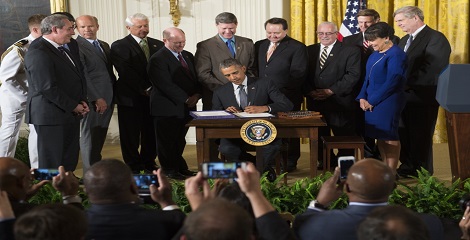After the 5 years of crucial talks 12 Pacific Rim countries have inked the major TPP agreement by creating the world’s largest free trade area. It has been signed after 5 days of talks in Atlanta, US and will now have to be approved by the lawmakers of each country.
- Deal aimed at to cuts trade tariffs and to set 21st century common standards in trade and investment for 12 Pacific Rim countries.
- The deal covers about 40% of the world economy.

12 PACIFIC RIM COUNTRIES SIGNED TPP
(Pacific Rim – Those are situated around the edge or rim of Pacific Ocean)
| Member Countries | Capital | Currency |
| Australia | Canberra | Australian dollar |
| Brunei | Bandar Seri Begawan | Brunei dollar |
| Canada | Ottawa | Canadian dollar |
| Chile | Santiago | Chilean peso |
| Japan | Tokyo | Japanese Yen |
| Malaysia | Kuala Lumpur | Malaysian ringgit |
| Mexico | Mexico City | Mexican peso |
| New Zealand | Wellington | New Zealand dollar |
| Peru | Lima | Peruvian nuevo sol |
| Singapore | Singapore | Singapore dollar |
| United States | Washington, D.C. | United States Dollar |
| Vietnam | Hanoi | Vietnamese dong |
UNDER THIS DEAL
- Japan has opened its market with concessions to major food exporters such as Australia, New Zealand and the United States.
- The US will decrease its tariffs on Japanese car parts from non-TPP locations like China and Thailand.
- Canada opens its market for dairy products from New Zealand
- Australia and Canada get higher sugar quotas in the United States.
- Elimination of around 18000 taxes on American goods.
WHAT IS TRANS- PACIFIC PARTNERSHIP?
The Trans-Pacific Partnership (TPP) is a trade agreement between Pacific Rim countries related to economic policy issues. It seek to lower trade barriers tariffs, establish a common framework for intellectual property, enforce standards for labour law and environmental law, and establish an investor-state dispute settlement mechanism.
CRITICISM
- It’s not only a trade deal agreement, the intellectual property section would implement laws that effects users freedom of expression, right to privacy and due process and hinder peoples abilities to innovate.
- Deal is negotiated under deep secrecy and public interest is kept aside. It is highly criticized by Public health advocates, environmentalists, and labour groups.




